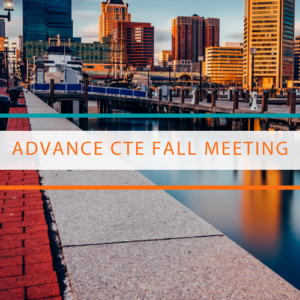 On October 27 and 28, over 270 state Career Technical Education (CTE) leaders gathered for Advance CTE’s 2021 Fall Meeting. Through timely plenary discussions, breakout and networking sessions, members and supporters were able to reflect on the transformations of the COVID-19 (coronavirus) pandemic, gain knowledge on the latest research and promising practices in states, and create community by building networks with leaders in similar roles.
On October 27 and 28, over 270 state Career Technical Education (CTE) leaders gathered for Advance CTE’s 2021 Fall Meeting. Through timely plenary discussions, breakout and networking sessions, members and supporters were able to reflect on the transformations of the COVID-19 (coronavirus) pandemic, gain knowledge on the latest research and promising practices in states, and create community by building networks with leaders in similar roles.
Advance CTE staff departed the meeting feeling energized and excited about the many ways our members are going above and beyond to advance the event theme, “Meeting CTE’s Moment”. This post shares top outcomes of Fall Meeting with reflections from Advance CTE staff.
1. Highlighting High-Quality, Equitable State Practices: Speakers from 22 states and 19 national organizations highlighted innovative state practices, and more importantly provided tangible lessons learned and first steps for leaders to implement the initiatives in their own state.
“The amazing work being shared by CTE leaders across the country was truly inspiring. The statewide mentorship program and New Teacher Institute in Missouri are best practices models for the nation to emulate. Allowing Local Education Agencies (LEA) to serve as an Educator Preparation Program (EPP) is an outstanding example of out-of-the-box thinking. Despite the crippling disparity in pay compared to the surrounding states, the program has yielded high retention rates by providing new teachers with the supports necessary to be effective practitioners. The jewel of the Fall Meeting, in my opinion, was South Carolina’s presentation on the combined efforts between the state’s CTE and Special Education departments to provide access to high-quality programs of study. The innovative process of evaluating the enrollment and performance of students with disabilities by specific disabilities is a model for developing equitable systems for all learners. I’m excited to see the strategies for improving academic success developed from the analysis and I hope the methodology becomes a national trend.” – Dr. Kevin Johnson, Sr., Senior Advisor
“One of my favorite parts of the Fall Meeting was the opportunity state leaders had to share challenges they were facing with top of mind topics and directly problem-solve with national CTE leaders. In a breakout session sharing the latest research on employer engagement, Director of Public Policy James Redstone from the Society of Human Resource Management (SHRM) offered advice to states on how to structure programs and outreach to better meet employer needs. In a session on connecting Social Emotional Learning (SEL) and CTE, renowned national SEL leader Dr. Scott Solberg was able to share best practices and common challenges gained from a network of over 20 states led by Collaborative for Academic, Social, and Emotional Learning (CASEL). Despite limits to capacity, our members are always so eager to keep innovating. Hearing lessons learned in states from a national perspective is so valuable in order to make the most of the resources and take the work on these topics and more to the next level.” – Stacy Whitehouse, Senior Associate, Communications and State Engagement
2. Elevating Learner Voice and Learner-Center Systems: Fall Meeting featured a dedicated series of breakout sessions focused on elevating high-quality examples of national tool and state initiatives that centered learners in policy and practice. Sessions on Advance CTE’s recently released learner voice toolkit and social capital featured CTE learners.
“The 2021 Fall Meeting intentionally focused on leveraging the learner voice within state CTE decisionmaking. I was thrilled to witness Advance CTE being joined by two esteemed learners over the two-day meeting: Autumn Steffens and Daraja Brown. Secondary learner Autumn shared her hopes for future learner engagement, “It makes me feel seen as a learner and will help with my decisionmaking in the future.” Postsecondary learner Daraja shared how she has leveraged her social capital to advance through career pathways, “It is important for me to find the different professionals, teacher and mentors that I connect with on a personal level…someone that is in my corner and cares about me and my professional development.” Ultimately, it is important that state and local CTE leaders with the ability to influence CTE policy and programming leverage stakeholders from all levels, including learners. By these actions, state and local CTE leaders are taking every opportunity to advance CTE, particularly under the new shared vision, to ensure each learner achieves career success.” – Brittany Cannady, Senior Associate, Digital Media
“Beyond reconnecting with so many familiar faces, I always love the opportunity to hear from national researchers and partners about exciting or important work in the field, especially those that highlight inequities or illustrate how to better leverage the work we all do to support all learners. Timely research from Strada Education Network and the Urban Institute really demonstrated for me the importance of reaching out to learners at the margins of education, whether they are learners disrupted by the pandemic or learners who don’t have access to high quality postsecondary CTE due to gaps in technology access. At the same time, our members bring these learners to the forefront and are working to design CTE programs that are high-quality and equitable. I always leave our meetings excited about the future of CTE!” – Dan Hinderliter, Policy Associate
3. Building Community: Fall Meeting not only provided an engaging chat feature where attendees routinely shared ideas and celebrated their peers, but also featured two role-alike sessions where leaders networked by professional role, identity and stakeholder level. For the first time, leaders of color also had a dedicated space to connect.
“Advance CTE members are no strangers to virtual meetings, and yet no one felt like strangers to each other. The sense of community and camaraderie was apparent via warm “good to see you” chats and among presenters who were meeting for the first time or reconvening for the hundredth time in a breakout session. We know that members have missed being in person together, but I find encouragement and meaning in the Fall Meeting as a culmination of building a virtual community over the past two years.” – Sara Gassman, Senior Associate, Member Engagement & Professional Learning
“The highlight for me was watching our members shout out each other and other members of their team for their incredible work to advance high-quality and equitable CTE! It was heartening and refreshing to see so many old and new colleagues and peers recognize their fierce commitment to CTE and innovative practices for a wide array of policies, such as establishing standing up new advisement systems, expanding equitable early postsecondary opportunities, building local capacity for identifying and closing opportunities gaps, and recruiting and retaining a more diverse CTE workforce, to name a few! Our members are doing amazing work and I love seeing that work recognized and celebrated by their peers across the country.” – Kate Kreamer, Deputy Executive Director
4. Advancing CTE Without Limits and Exploring the Future of CTE: Fall Meeting was grounded in the five principles that comprise Without Limits: A Shared Vision for the Future of Career Technical Education (CTE Without Limits), and each series of breakout sessions sought to challenge the limits of state leaders to transform systems so that each learner can achieve success in the career of their choice.
“Just seven months after CTE Without Limits was released, it was incredible to see how state CTE leaders are thinking about operationalizing the principles. I had the privilege of listening in on Lisa Stoner-Torbert’s session on Delaware’s PIPEline for career success program for learners with disabilities, which demonstrates how flexible career pathways, aligned funding and cross-sector partnerships can provide historically marginalized learners the means to succeed in their chosen career pathways.” – Austin Estes, Data & Research Manager
“Another standout moment was during the Ensuring Access to CTE for All Learners Through Equitable Recruitment and Admissions Requirements session. The speaker, Ms. Tiara Booker-Dwyer, Assistant State Superintendent, Maryland State Department of Education, so eloquently shared the importance of diversity in advancing our vision for CTE through a visual “band” analogy. She explained the need to have “all instruments” represented in order to produce great music and how the lottery system in their state was not allowing for “all instruments” to have a chance to be part of the band. Her example provided the why behind the work as she shared policy and practices their state edited to create more equitable access to programs. The co-presenters for the session from the state of Massachusetts’ Department of Elementary and Secondary Education, Cliff Chuang, Senior Associate Commissioner and Elizabeth Bennett, Associate Commissioner of CCTE, also incorporated CTE Without Limits in their concrete examples of how they have revised state policy and law to create a path for all learners to be recruited and admitted in high-quality CTE programs in their state.
It was great to hear and learn from state leaders and funders who believe and are invested in the CTE Without Limits vision. State leaders were inspired to innovate, be bold and take action to execute the vision without limits in their respective states.” – Nithya Govindasamy, Senior Advisor
5. Connecting Federal Policy to State Action: Fall Meeting attendees had the opportunity to receive updates on the latest federal policies and supports from senior officials at the U.S. Department of Labor (DOL) and the U.S. Department of Education’s Office of Career, Technical, and Adult Education (OCTAE).
“The highlight of the Fall Meeting for me was the opportunity to facilitate a discussion with DOL on the lasting effects of the pandemic on the labor force and the future of work. The discussion elevated the necessity for alignment across secondary, postsecondary and the workforce and the opportunity for CTE to bridge that alignment. It was clear that DOL is supportive of the work our members are conducting in all states. and that the administration wants to continue to fund initiatives that support the economic recovery of our nation and challenge our limits on innovative programming and learner engagement in high-quality career pathways.” – Jeran Culina, Senior Policy Associate
If you were not able to attend the Fall Meeting, don’t worry – Advance CTE’s Spring Meeting is not too far away. Advance CTE is carefully considering the safety and needs of members as we determine the best format and capacity for this event, and more information will be coming soon. In the meantime, visit Advance CTE’s Learning that Works Resource Center to access the reports, resources and tools shared during Fall Meeting.
Stacy Whitehouse, Senior Associate Communications and State Engagement
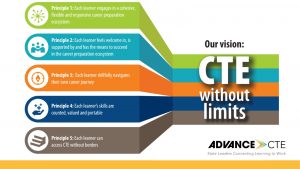 March 2022 marks one year since the release of Without Limits: A Shared Vision for the Future of Career Technical Education (CTE Without Limits). CTE Without Limits positions CTE as the catalyst for achieving a cohesive ecosystem that is responsive to each learner’s needs for college and career success.
March 2022 marks one year since the release of Without Limits: A Shared Vision for the Future of Career Technical Education (CTE Without Limits). CTE Without Limits positions CTE as the catalyst for achieving a cohesive ecosystem that is responsive to each learner’s needs for college and career success.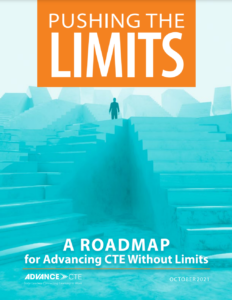 Achieving CTE Without Limits is only possible through shared commitment and action among all CTE stakeholders The Pushing the Limits roadmap serves as the primary evaluation and planning tool for state and local CTE leaders to conduct a collaborative process that: a) provides an initial assessment of state policy and practice; b) identifies top areas for action; and c) develops implementation strategies for one or more vision principles.
Achieving CTE Without Limits is only possible through shared commitment and action among all CTE stakeholders The Pushing the Limits roadmap serves as the primary evaluation and planning tool for state and local CTE leaders to conduct a collaborative process that: a) provides an initial assessment of state policy and practice; b) identifies top areas for action; and c) develops implementation strategies for one or more vision principles.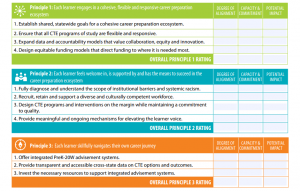 Effective use of the roadmap requires intentional planning and collaboration. Here are five ways to get started:
Effective use of the roadmap requires intentional planning and collaboration. Here are five ways to get started: 

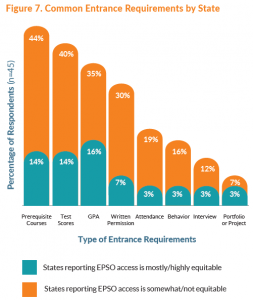 3.Identify and remove barriers to access, including restrictive costs or entrance requirements, and target specific learner populations for recruitment.
3.Identify and remove barriers to access, including restrictive costs or entrance requirements, and target specific learner populations for recruitment. 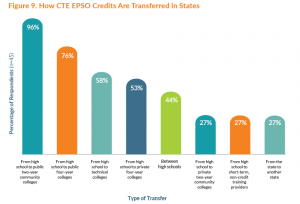 5.Expand statewide and inter-state articulation agreements to account for all types of CTE EPSOs. Statewide agreements can help guarantee recognition of CTE EPSO credit and facilitate automatic transfer between a secondary institution and a corresponding postsecondary institution of the learner’s choice. Ensuring that the transfer of credit is as frictionless as possible is vital to supporting learners as they transition into postsecondary education and continue in a degree program. As states work to ensure that each learner’s EPSO experiences consistently are counted toward articulated credit, they should also ensure that this credit contributes to core credits in a CTE program of study and not just elective credit. States can develop additional guidelines and legislation that ensures the connection between an EPSO and a program of study. Ohio has Career-Technical Assurance Guides (CTAGs) that provide automatically articulated and transferable credit upon completion of CTE coursework.
5.Expand statewide and inter-state articulation agreements to account for all types of CTE EPSOs. Statewide agreements can help guarantee recognition of CTE EPSO credit and facilitate automatic transfer between a secondary institution and a corresponding postsecondary institution of the learner’s choice. Ensuring that the transfer of credit is as frictionless as possible is vital to supporting learners as they transition into postsecondary education and continue in a degree program. As states work to ensure that each learner’s EPSO experiences consistently are counted toward articulated credit, they should also ensure that this credit contributes to core credits in a CTE program of study and not just elective credit. States can develop additional guidelines and legislation that ensures the connection between an EPSO and a program of study. Ohio has Career-Technical Assurance Guides (CTAGs) that provide automatically articulated and transferable credit upon completion of CTE coursework. “Go forth without limits!” was an apt parting chat message as over 70 state Career Technical Education (CTE) leaders from across 16 states convened virtually last month to launch the community of practice for
“Go forth without limits!” was an apt parting chat message as over 70 state Career Technical Education (CTE) leaders from across 16 states convened virtually last month to launch the community of practice for 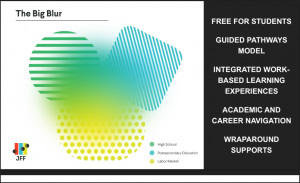 Vargas challenged attendees to dream big and be the new models for scalable solutions by being a “network facilitator,” by combining career pathway expansion with intentional investments in collaboration and sustained partnershi
Vargas challenged attendees to dream big and be the new models for scalable solutions by being a “network facilitator,” by combining career pathway expansion with intentional investments in collaboration and sustained partnershi These organizations are a powerful model for learner-centered and learner-led education, and Advance CTE is pleased to be joined by seven national CTSOs in supporting the national vision for CTE.
These organizations are a powerful model for learner-centered and learner-led education, and Advance CTE is pleased to be joined by seven national CTSOs in supporting the national vision for CTE. 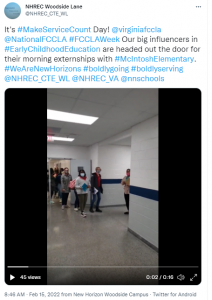 FCCLA members at New Horizons Regional Education Center: Woodside Lane in Newport News,
FCCLA members at New Horizons Regional Education Center: Woodside Lane in Newport News,  Griffin Middle School in
Griffin Middle School in 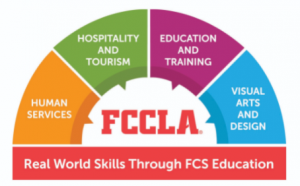 FCCLA strives for FCCLA members to have clear paths for their skills to be valued and counted. FCCLA has identified four career pathways that align to key technical and “employability” skills gained through FCCLA experiences, listed below. Members also have the opportunities to test and display skill competencies at
FCCLA strives for FCCLA members to have clear paths for their skills to be valued and counted. FCCLA has identified four career pathways that align to key technical and “employability” skills gained through FCCLA experiences, listed below. Members also have the opportunities to test and display skill competencies at 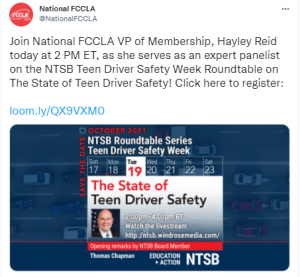 FCCLA members have the opportunity to share their skills and make connections beyond the classroom and even their state. National FCCLA leader Hayley Reid participated in a federal policy panel held by the National Transportation Safety Board.
FCCLA members have the opportunity to share their skills and make connections beyond the classroom and even their state. National FCCLA leader Hayley Reid participated in a federal policy panel held by the National Transportation Safety Board.  Meet Stacy Whitehouse! Stacy is the Senior Associate for Communications and State Engagement at Advance CTE. Stacy works to develop and implement communications and outreach strategies that support state CTE leaders. Some of her most recent initiatives include communications research for
Meet Stacy Whitehouse! Stacy is the Senior Associate for Communications and State Engagement at Advance CTE. Stacy works to develop and implement communications and outreach strategies that support state CTE leaders. Some of her most recent initiatives include communications research for 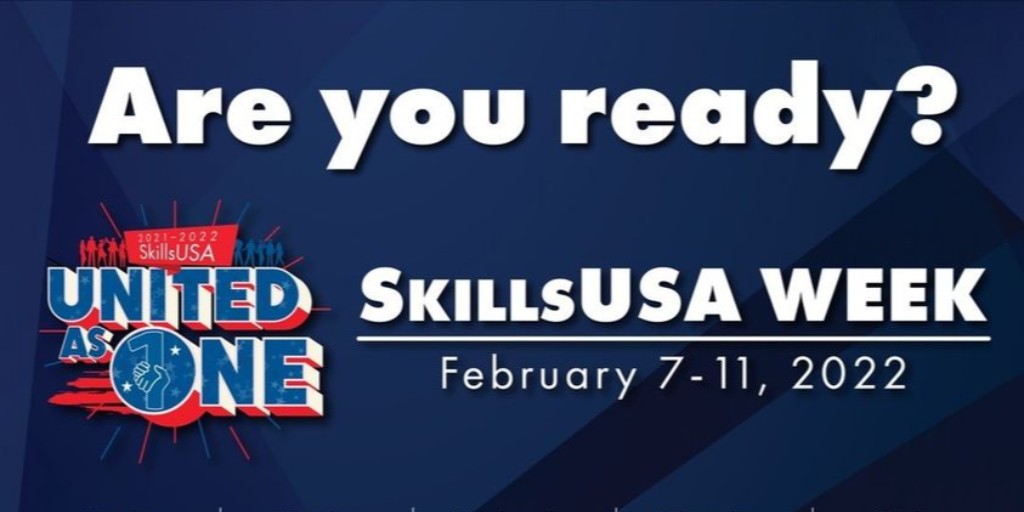 Throughout February, the
Throughout February, the 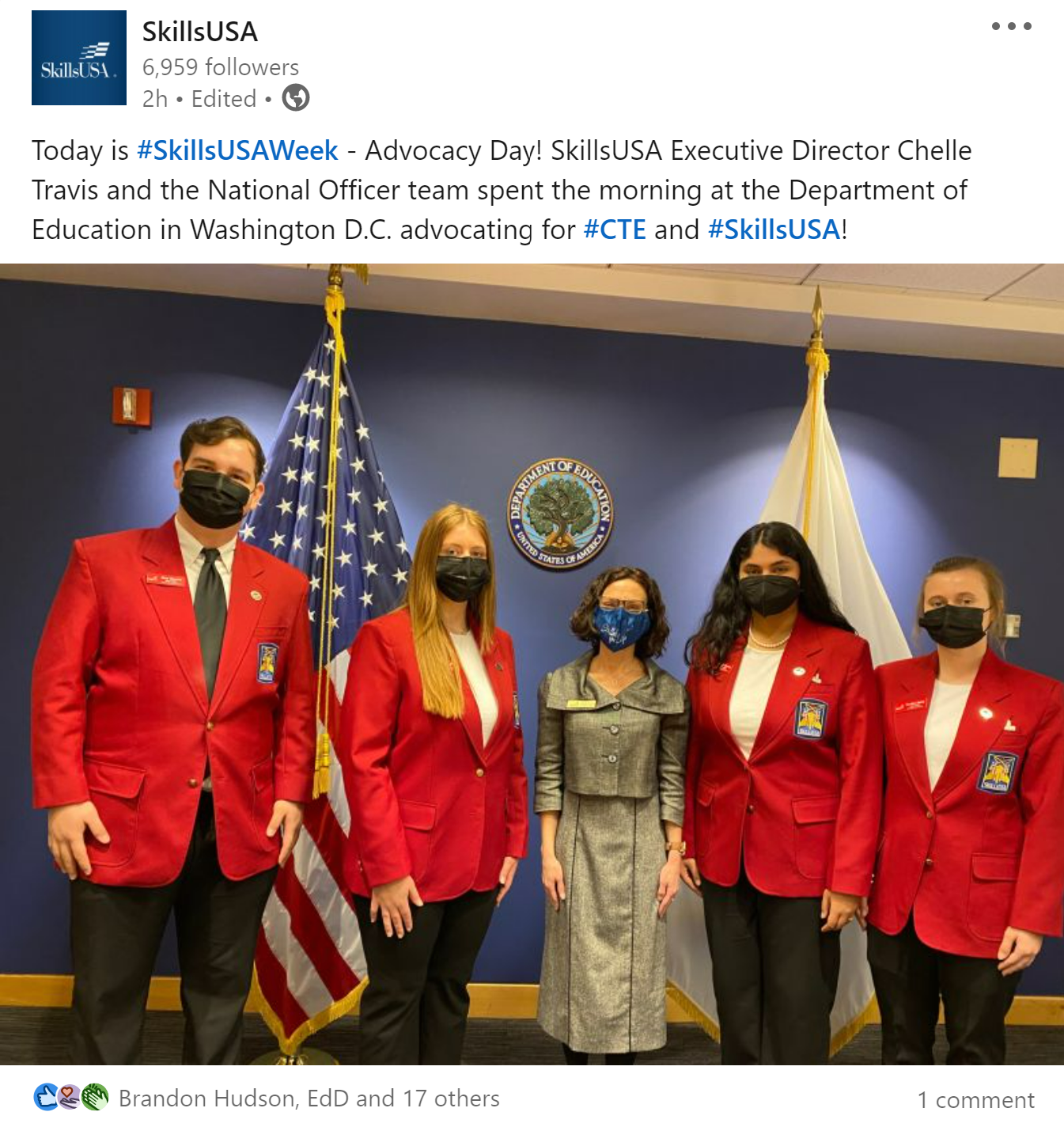 On Recognition Day, SkillsUSA took to social media to recognize and honor members, advisors, administrators, business partners, community leaders and supporters who are impactful in the career preparation ecosystem and within their local SkillsUSA chapters. Honorees were presented with a SkillsUSA Certificate of Appreciation.
On Recognition Day, SkillsUSA took to social media to recognize and honor members, advisors, administrators, business partners, community leaders and supporters who are impactful in the career preparation ecosystem and within their local SkillsUSA chapters. Honorees were presented with a SkillsUSA Certificate of Appreciation.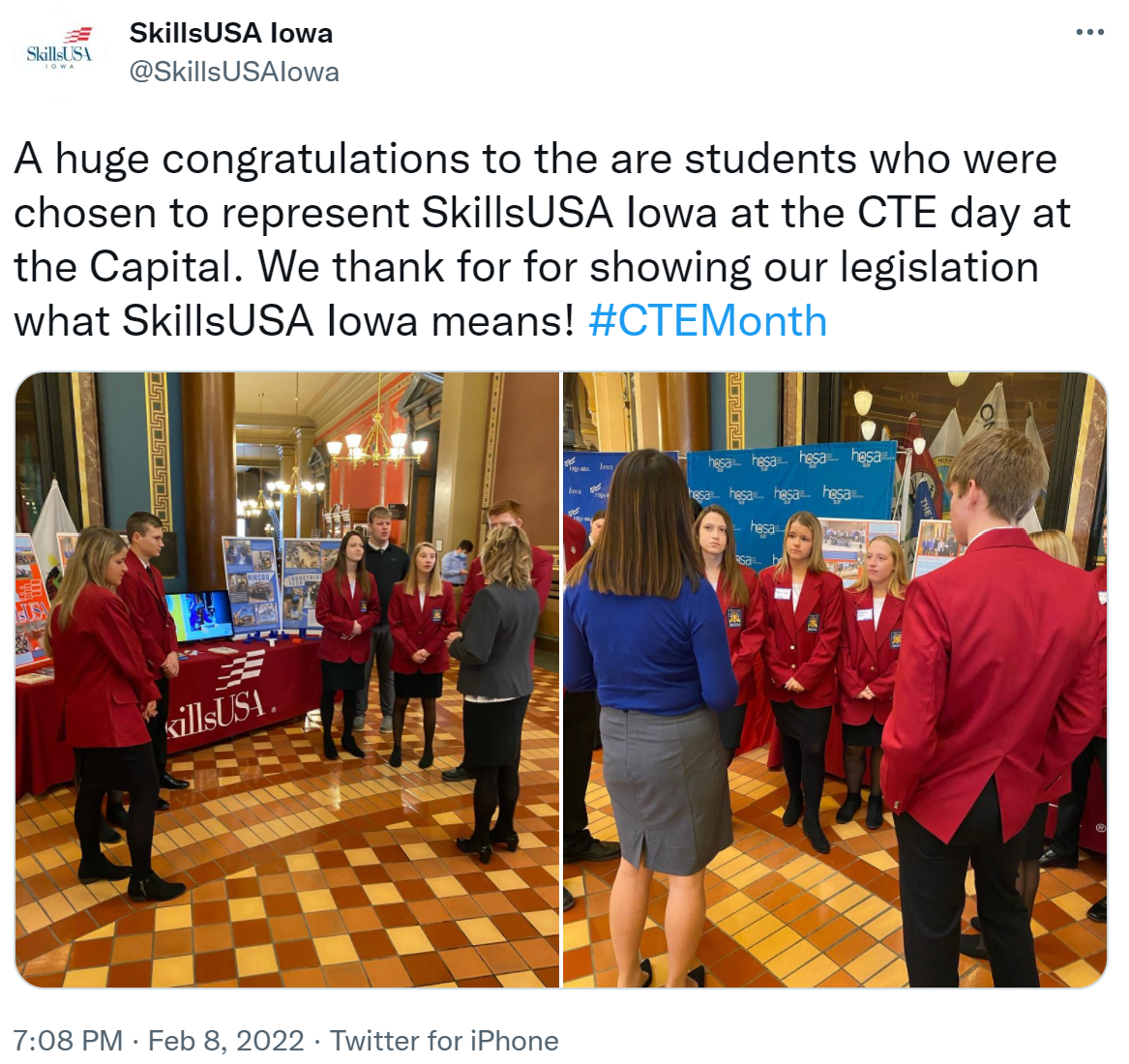 Complementing national advocacy efforts by the CTSO, many SkillsUSA state associations hosted their own CTE Days on Capitol Hill, as seen by SkillsUSA Iowa.
Complementing national advocacy efforts by the CTSO, many SkillsUSA state associations hosted their own CTE Days on Capitol Hill, as seen by SkillsUSA Iowa.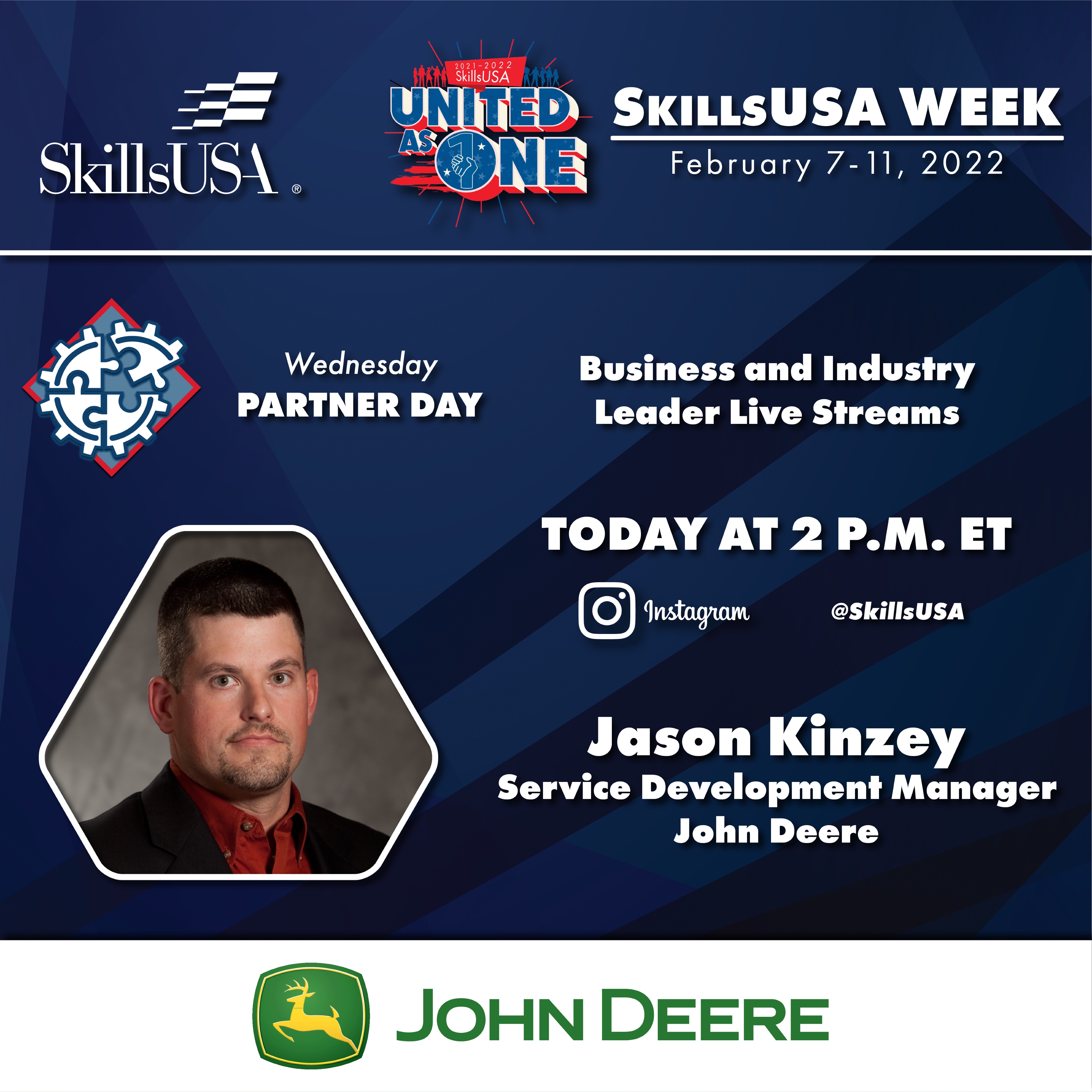 On Partner Day, National SkillsUSA asked state associations and local chapters to connect with partners in their communities. National SkillsUSA hosted a live interactive session for CTSO members to engage with business and industry leaders. Learners were able to hear what it means to be workforce ready and which skills are valued by employers that ultimately lead to career success in their respective industries.
On Partner Day, National SkillsUSA asked state associations and local chapters to connect with partners in their communities. National SkillsUSA hosted a live interactive session for CTSO members to engage with business and industry leaders. Learners were able to hear what it means to be workforce ready and which skills are valued by employers that ultimately lead to career success in their respective industries. 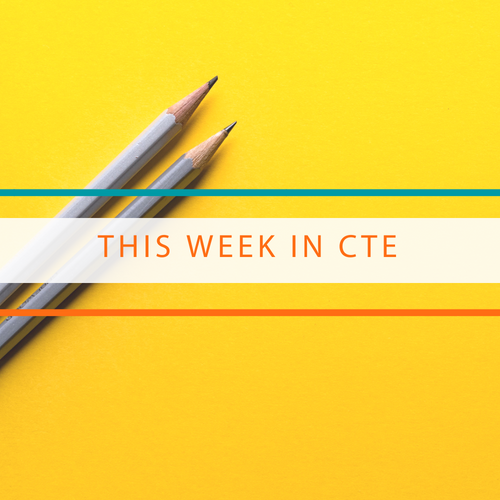 While stakeholders across the Career Technical Education (CTE) continuum celebrate CTE Month®, Advance CTE will join in the celebration by uplifting Career Technical Student Organization (CTSO) student leaders and their national advocacy weeks.
While stakeholders across the Career Technical Education (CTE) continuum celebrate CTE Month®, Advance CTE will join in the celebration by uplifting Career Technical Student Organization (CTSO) student leaders and their national advocacy weeks. 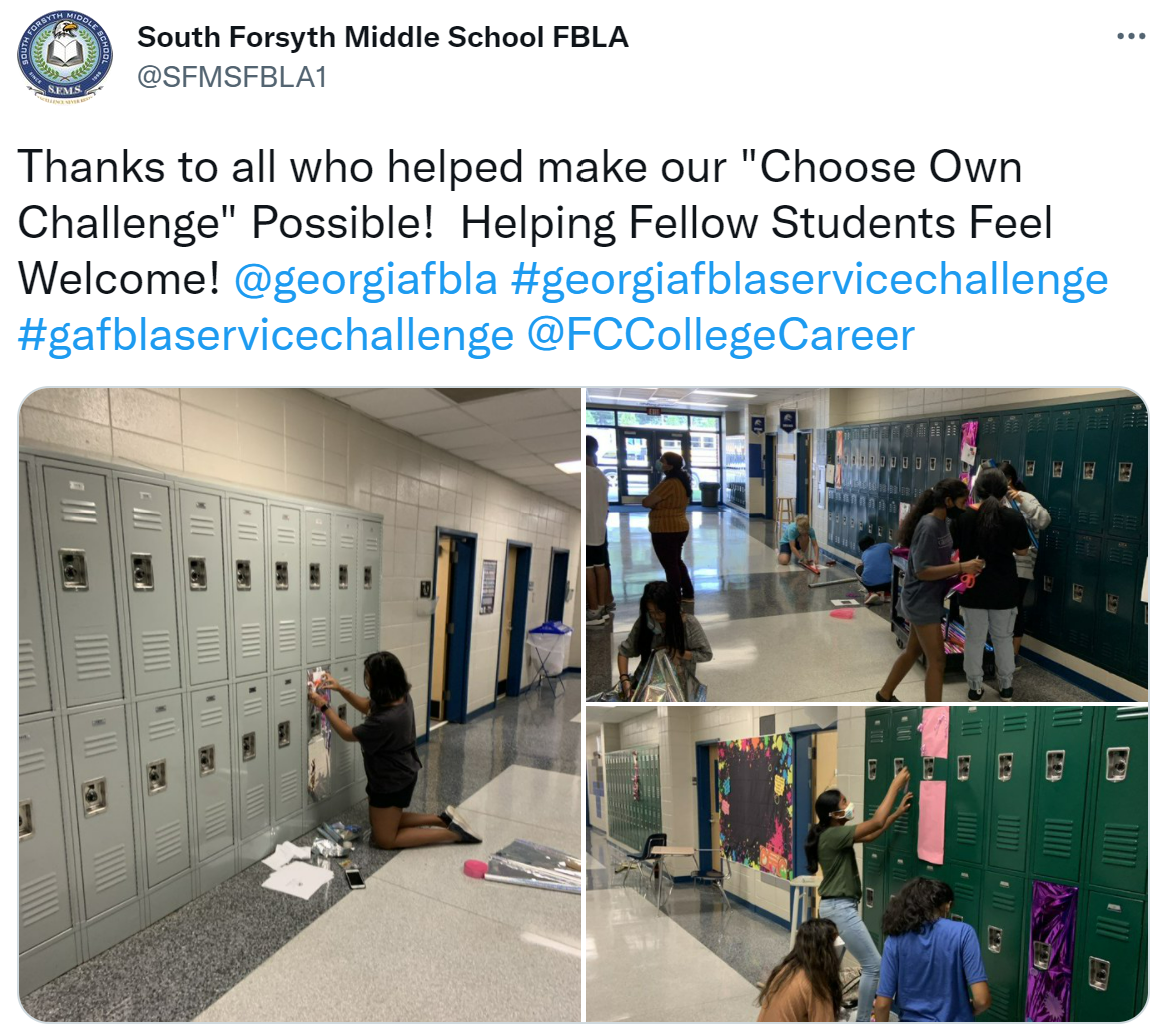 CTSO leaders can be impactful ambassadors to help each learner feel welcome not only in CTE, but in their school and community. FBLA members at a Georgia middle school used their state chapter’s monthly service challenge as an opportunity to help fellow students feel seen and welcome.
CTSO leaders can be impactful ambassadors to help each learner feel welcome not only in CTE, but in their school and community. FBLA members at a Georgia middle school used their state chapter’s monthly service challenge as an opportunity to help fellow students feel seen and welcome. 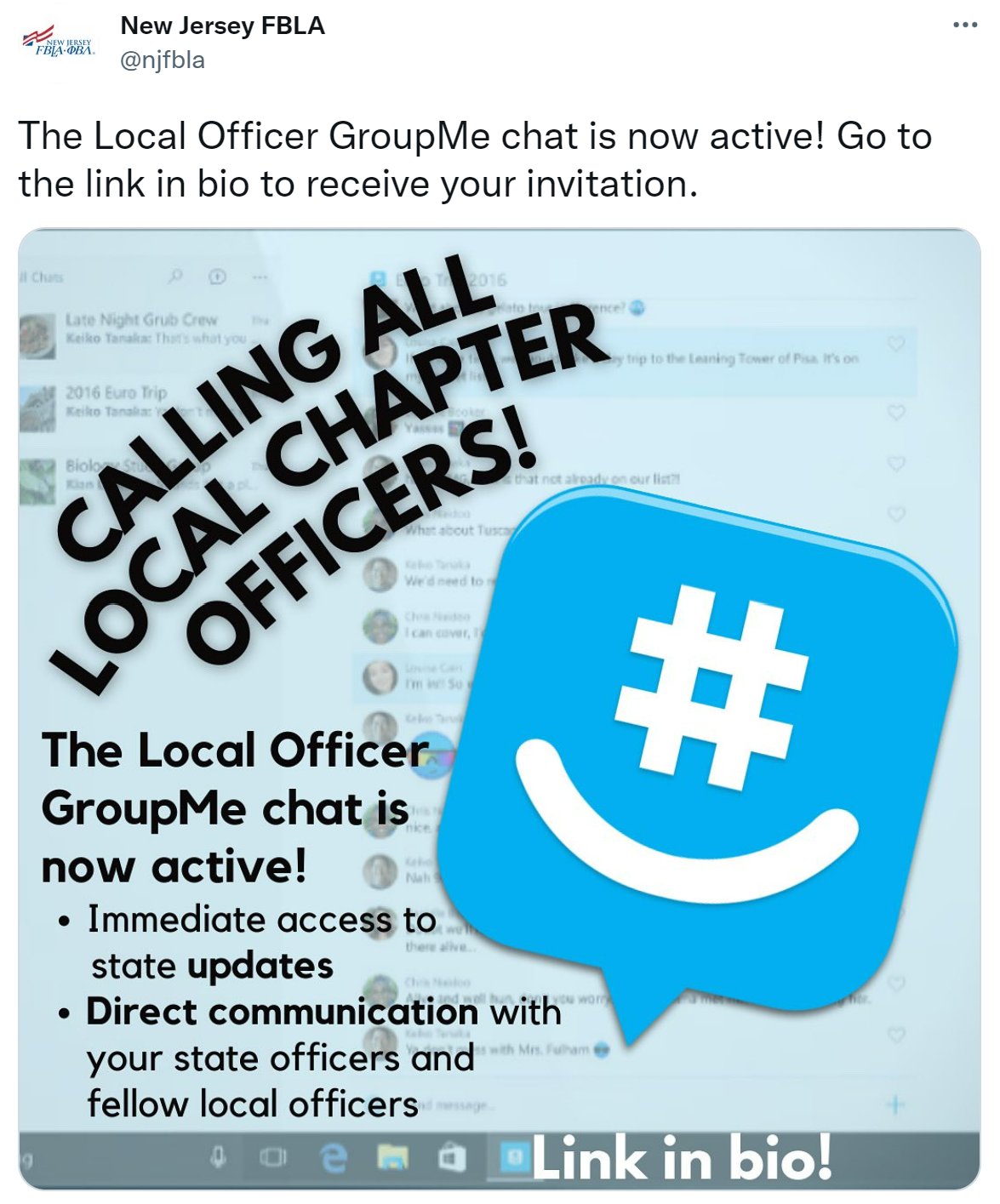 Meaningful connections are also being pursued through programs at the state level, such as
Meaningful connections are also being pursued through programs at the state level, such as 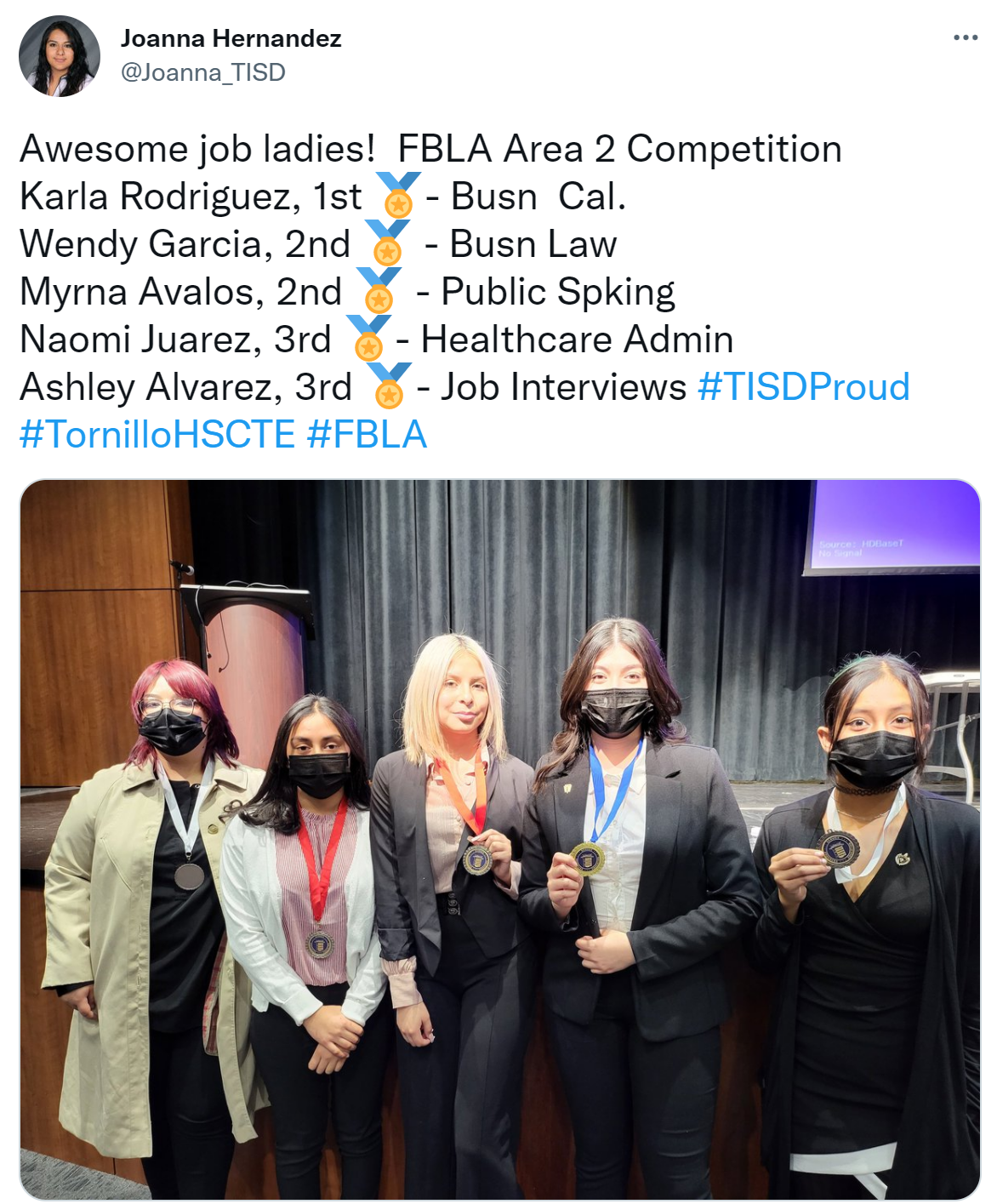 Over the past several weeks, FBLA-PBL members from across the country have demonstrated their skill competencies and high-quality CTE-focused projects through competitions at the area and regional level. Learners receiving top awards will compete at the state and national level to inspire and advance high-quality CTE without limits.
Over the past several weeks, FBLA-PBL members from across the country have demonstrated their skill competencies and high-quality CTE-focused projects through competitions at the area and regional level. Learners receiving top awards will compete at the state and national level to inspire and advance high-quality CTE without limits.  Meet Nithya Govindasamy! Nithya is a Senior Advisor at Advance CTE; she recently joined the organization in October 2021. Nithya leads and manages major organization-wide, highly visible initiatives that support, promote and increase equitable access to and success in high-quality CTE, which includes: workforce development, education and equity initiatives; technical assistance (TA) for
Meet Nithya Govindasamy! Nithya is a Senior Advisor at Advance CTE; she recently joined the organization in October 2021. Nithya leads and manages major organization-wide, highly visible initiatives that support, promote and increase equitable access to and success in high-quality CTE, which includes: workforce development, education and equity initiatives; technical assistance (TA) for  On October 27 and 28, over 270 state Career Technical Education (CTE) leaders gathered for Advance CTE’s 2021 Fall Meeting. Through timely plenary discussions, breakout and networking sessions, members and supporters were able to reflect on the transformations of the COVID-19 (coronavirus) pandemic, gain knowledge on the latest research and promising practices in states, and create community by building networks with leaders in similar roles.
On October 27 and 28, over 270 state Career Technical Education (CTE) leaders gathered for Advance CTE’s 2021 Fall Meeting. Through timely plenary discussions, breakout and networking sessions, members and supporters were able to reflect on the transformations of the COVID-19 (coronavirus) pandemic, gain knowledge on the latest research and promising practices in states, and create community by building networks with leaders in similar roles.